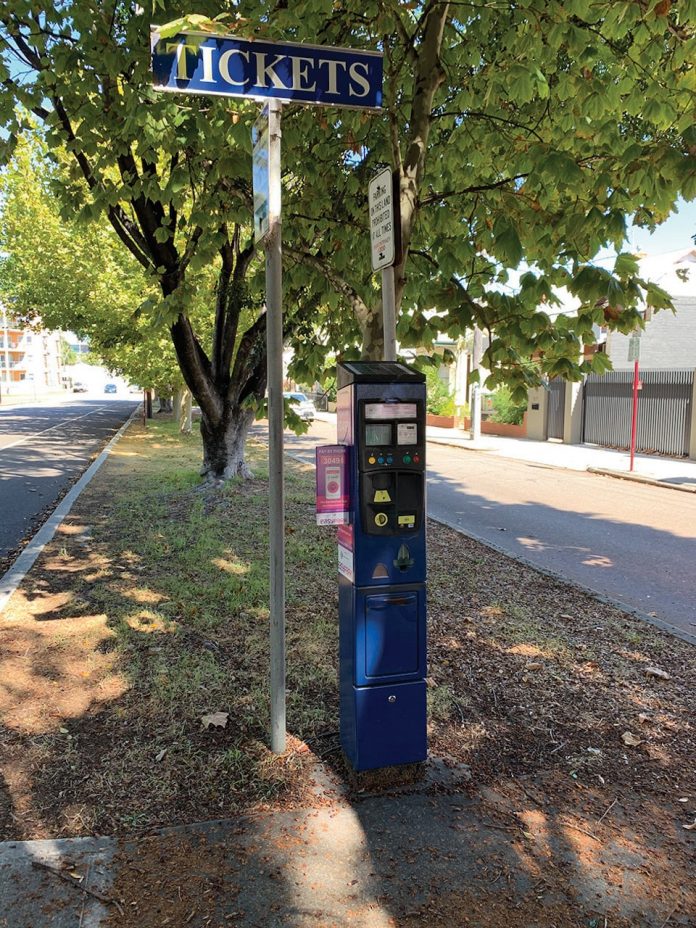What is to be done about the greatest of humankind’s bugbears, that steely sentinel, the parking meter?
Parking meters are a deterrent to shopping and dining and hurdles to studying and attending hospitals.
Retailers and councils spend big on promoting their shops, their wares and their attractions but much of their investment is wasted because of parking problems, or the perception of them.
So much for shopping being a pleasant experience.
Given the enormous switch in shopping habits to online ordering, parking issues are a bigger threat to the retail bottom line.
There’s no end to tales of woe with parking.
A newspaper photographer parked in Fremantle and wandered to the nearest meter, which was some way up the road. By the time he got back to his car with paid ticket set for his dashboard, the inspector had pounced.
The photographer then was required to take the ticket to council chambers and make a claim for a refund, which he did. Welcome to the shops.
I once parked for just 20 minutes on a three-hour meter and copped a ticket. The recovery process was so demanding I grudgingly forfeited the $50.
Nurses arriving at hospitals for work have to battle with policed, paid parking. As do arriving patients and carers. Don’t even mention airport parking.
Curtin University is among those learning places patrolled by parking police in golf carts. First-time visitors and students would do well to consult passing regulars to learn how to master the modern meters.
Students have to factor into the cost of their education, substantial daily parking fees and the odd fine (as when their parking receipt has fallen from the dashboard and can’t be seen by the inspector).
There are big profits for the private companies with rights to police parking. A Melbourne council spent $817,000 on a five-year parking system contract.
Council have myriad ways of tackling parking.
Cottesloe parking bays may be the way to go on policing. Some bays are imbedded with hidden glass tubes and others have a sensor beam that detects when cars arrive and leave. Parking inspectors are on-the-ball for expiring cars but parking is free and there are no ugly grey meters.
Over generations, billions of dollars have been spent worldwide to install, service and monitor people’s parking since the world’s first working parking meter, the Black Maria, appeared in the US in 1935.
Australia’s parking meters have spread like a virus since the 1950s.
There was one bright spot when the Surfers Paradise metermaids appeared, bikini-clad, in 1964 to help announce paid parking.
The gold-bikini girls pumped money into expired meters to help drivers ease into what was ahead.
Don’t you hate the meters around shops and cafes that require drivers to guestimate how long they will be parked before they pump-in their coins, notes or credit cards?
What a bugbear! While enjoying yourself shopping, eating or socialising, you have to be mindful of the time and dash back to beat the clock. This is to the detriment of shops and cafés because you may well have extended your time shopping, eating and spendt more money.
Some popular parking stations have limited meters so customers are forced to queue (rain or no) to pay-up. Bad luck if you are elderly, a foreigner or disabled, struggling with sometimes confusing and hard-to-read instructions.
All-in-all, parking meters are a total turn-off, adding to life’s stresses.
Of course, parking has to be policed to prevent parking hogs, penalties have to be imposed and money has to be collected. But there has to be a better, friendlier way.
Shuttle buses have found only limited favour with shoppers but could be further developed.
Driverless cars could drop us at destinations, park way outside shopping areas and can collect us when WE are ready.
Lateral thinkers, please!
What do you think?
Email info@haveagonews.com.au with Opinion in the subject line.





























